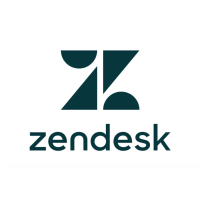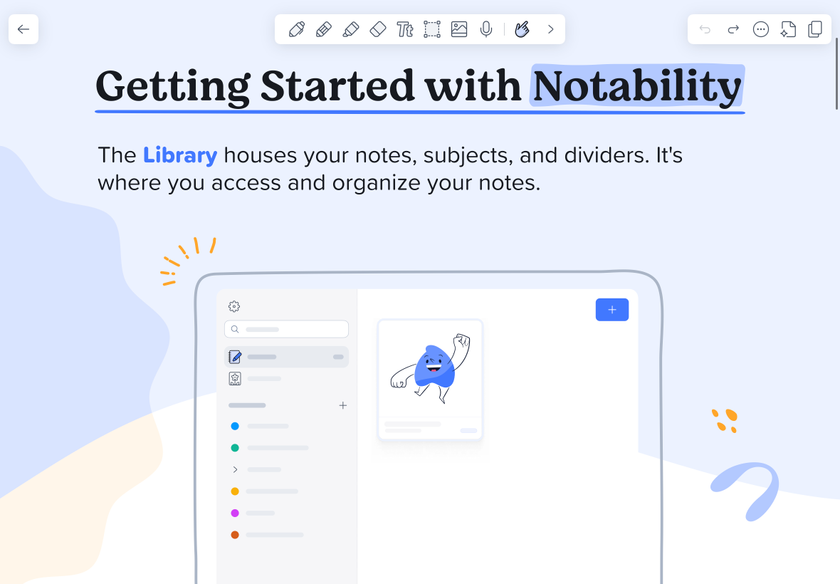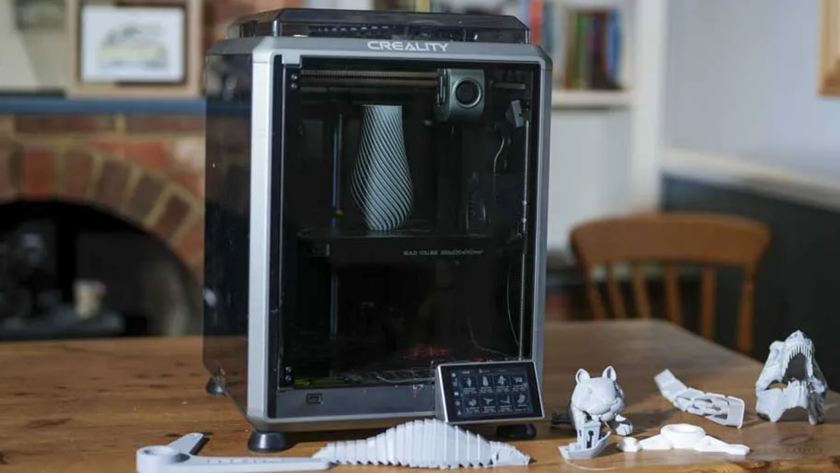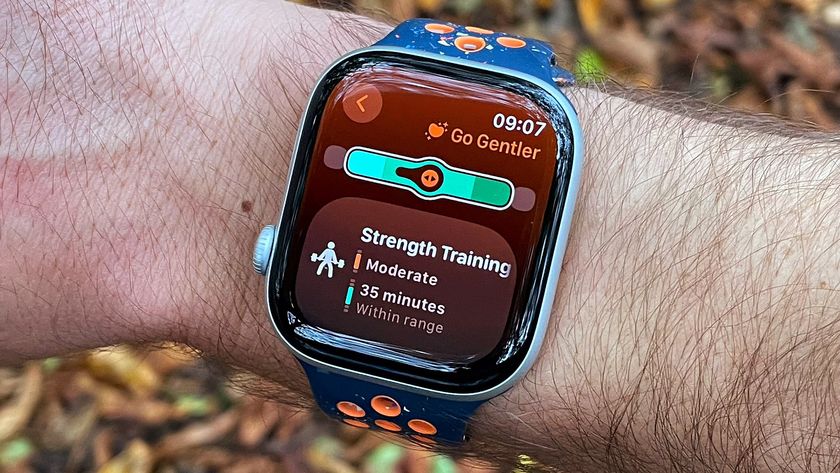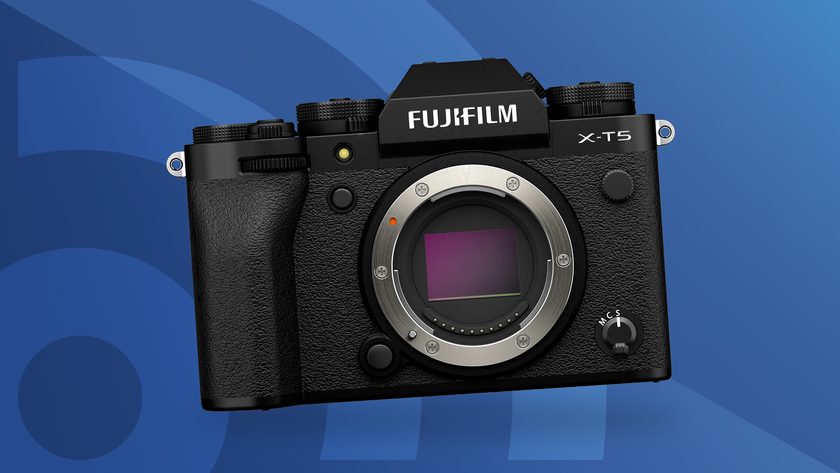Best remote desktop software of 2025
Access PCs remotely from anywhere

- Best for enterprises
- Best for features
- Best cross-platform
- Best for large networks
- Best for small business
- Best all-rounder
- Best for tools
- Best for mobile devices
- Best for occasional users
- Best for Windows users
- Best for unattended access
- Best free option
- Best for reliability
- Best for security
- Best for simplicity
- Honorable mentions
- FAQs
- Which remote desktop software is best for you?
- How we test
We list the best remote desktop software, to make it simple and easy to access your PC or business network from anywhere.
Using remote access software, despite what you might think, is actually quite simple. They generally take but just a few minutes to get up and running. The usual starting point involves the installation of the software on the computer or other device you want to access the remote computer from. In some cases, programs also need an installation on the remote PC, while in other cases, the devices form a connection via a weblink or access code.
Some versions of Windows, such as Windows 11 Pro, do come with built-in remote desktop software that is known as Remote Desktop. While this is ok for occasional use, dedicated third-party software will generally be easier to use and come with significantly more features. This will be especially important for those planning on regular use of this type of software.
In the age of hybrid work, these software solutions are increasingly used regularly too. Apple CEO Tim Cook once called remote work "the mother of all experiments" but the right remote desktop software can bring a lot more certainty to these experiments.
There are a handful of popular uses for the best remote desktop software. One popular use case is handling complicated tasks from a laptop remotely by connecting to a more powerful computer. Therefore, the less powerful laptop can gain access to the better computing resources of the desktop system so it can take on more complicated tasks than it could handle locally.
Additionally, remote desktop software can be used by IT teams to roll out important software updates and upgrades across a network. This isn't just handy for working outside of the office, but is also essential if the business has multiple premises that require working on.
Alternatively, another common example concerns remote support. In these scenarios, IT support staff use remote access programs to gain access to a client’s computer, after which they can assess and repair any software issues.
The best remote desktop software is no longer just a command prompt for commands - these days they often come with a GUI, with inbuilt tools for collaboration, not just for documents and spreadsheets, as well as voice chat and video options.
Below we list what we think are the best remote desktop software platforms currently available.
Reader offer: No credit card required
Zendesk's remote software is a powerful omnichannel platform featuring an intuitive ticketing system, robust analytics, and seamless integrations, providing businesses with a unified and efficient customer support solution. Try for free now.
Preferred partner (What does this mean?)
We've also featured the best help desk software.
The best remote desktop software of 2025 in full:
Why you can trust TechRadar
Best remote desktop software for enterprises
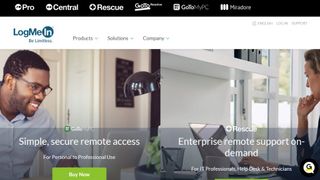
Reasons to buy
Reasons to avoid
LogMeIn Pro is one of the most popular remote desktop access programs available, and it’s a great choice for large businesses. While it can be criticized for being a little expensive, realize that it comes with a great range of tools designed for enterprise users. These tools include power features beyond just the remote access itself, such as multi-monitor support, an unlimited number of users, and remote printing.
Beyond that, all three tiers of each package include useful extras, such as 1 TB of cloud storage, LogMeIn Antivirus, and the password manager LastPass Premium.
These can certainly be useful, and in fact represent good value, as users are typically in need of cloud storage, an antivirus program, and a password manager. As these extras undoubtedly drive up the price, we do wish there was an option to price these extras, which are more ‘nice-to-haves,’ and are not an absolute requirement for remote access on an a la carte basis. We would suggest that LogMeIn at least offer a lowest tier that did not have all three of them built into the package offering - maybe, in fact, none of these extras - at a more aggressive price point.
Plans start with two remote connections at the lowest of the three tiers, with up to ten connections on the highest plan. There is also a middle-tier plan offering five remote connections. While there previously was a 14-day free trial available, this is no longer the case. It is down to a shorter 7 days and requires some searching to find it. Additionally, LogMeIn Pro is easy to set up, highly secure, and backed by 24/7 live support. Note, though, that its performance can be a little slow at times.
One of the most appealing aspects of LogMeIn Pro has to be the great level of customer support on offer. However, we were disappointed to see that most of it was self help, via a search bar and community forum. We were unsuccessful in finding a number to call, a direct email or a support portal for direct contact. If you're a beleaguered IT manager, this may not be the kind of help that you need.
However, LogMeIn Pro does continue to have a fine set of features and functions, all of which make it universally appealing, especially with the fairly bulletproof security features that also come as part of the package. Overall, we would say that the pricing on the packages is expensive, so this is more for someone who needs frequent and reliable remote PC access, and not for a more casual user.
Read our full LogMeIn Pro review.
Best remote desktop software for features
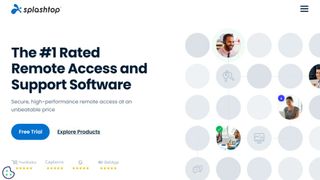
Reasons to buy
Reasons to avoid
Splashtop is a versatile remote computer access program with a range of impressive features, including a user-friendly interface and impressive security. It’s compatible with most common operating systems, including Mac, Windows, iOS, and Android with a worldwide customer base in excess of 30 million users that have used it for a staggering 800+ million sessions.
Splashtop comes in a number of specialized forms; while we like that each offers a free 7-day trial, it can be confusing which to choose. Prices for Splashtop Business Access, the lowest cost plan, enables remote access to a specified number of computers, and also offers up to a 25% discount. Next up is the Splashtop SOS plan, which for a higher price offers “Attended and unattended remote support software.” The top plan is the Remote Support one, which can cater to up to 25 computers, offering remote support, and endpoint management software.
Even on the entry plan, support options are more than reasonable. We found a search box to access Knowledge Base information, a community forum, and multiple articles that covered specific topics. Beyond the self-help, we also appreciate the support portal to submit a request, the chat box, and a direct phone number, with hours of operation listed as 8 AM to 6 PM on weekdays.
Overall, Splashtop is a powerful remote desktop connection manager backed by highly targeted plans and great security. New users will benefit from a seven-day trial with the software package of their choice, but be aware that payments are only available on an annual basis.
Splashtop is a great choice for those without much tech experience. It’s easy to set up and the user interface is responsive and quite friendly for novices. The software also comes with some great extra features and powerful security on all levels.
Read our full Splashtop review.
Best cross-platform remote desktop software
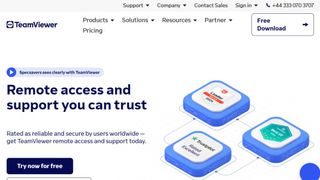
Reasons to buy
Reasons to avoid
TeamViewer is a powerful remote access program that enables remote access to and from computers, mobile devices, network machines, and more. It is also quite popular, boasting over 2.5 billion connected devices, and the ability to host up to 45 million simultaneous users.
In fact, the manufacturer states that it supports 130 different devices, which is more than twice its closest competitor. Unfortunately, though, this level of compatibility comes with an increased cost, meaning this is ultimately not a cheap remote desktop solution.
There are two versions of TeamViewer available for personal users, but businesses and other commercial users will have to upgrade to an enterprise subscription plan. The cost is quite expensive, however, TeamViewer offers impressive cross-platform compatibility, which includes remote mobile access and IoT-device compatibility.
TeamViewer has lots to offer, especially for larger organizations that need the extra muscle for their remote desktop software needs. The pricing structure is certainly geared more towards big firms and those with IT departments. This is made even more of a positive aspect thanks to the way the software can be deployed across multiple machines so easily.
Then there are the collaboration tools, such as voice, chat and video options, all of which come into their own when you have to deal with multiple employees. There’s also the security factor with TeamViewer, with an array of cool features that help to make it one of the most secure remote desktop software options on the market. More specifically, there is the 256 bit AES End-to-End Encryption, two-factor authentication, a trusted devices option, and granular access management. All in all, there is much to like about this product.
Read our full TeamViewer review.
Best remote desktop software for large networks
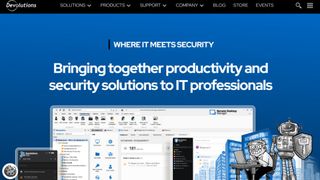
Reasons to buy
Reasons to avoid
Remote Desktop Manager is a powerful remote computer access program offering scalable solutions for large businesses. It’s compatible with both Android and iOS devices and comes with a selection of impressive security features. It indicates that it has 800k users worldwide across 140 countries.
There is a limited free tier available, but it lacks nice extras such as integration with a password manager, role based access control, and two factor authentication. These missing features are sure to have users look at the paid plan, but unfortunately, Remote Desktop Manager gets slightly expensive, with only a single choice of the Team Plan, which has a 30-day trial. Custom enterprise-level solutions are also available.
Generally, though, Remote Desktop Manager is one of the best network management solutions available for medium- to large-sized businesses. Role-based access controls are a major plus for IT administrators managing multiple teams across departments. Users also appreciate the offline mode to keep access to the database when offline, the audit trail to capture all access events, and the ability to track who is connected via the real-time connection status.
Help is available via numerous methods, including a knowledge base and community forum. We also like that there is both an email and a phone number to communicate directly, although the hours of operation are limited to 7:30 AM to 6:00 PM EDT on weekdays.
The wealth of integrations is also a benefit, since you won’t have to completely transition away from existing password managers or authentication systems. That said, smaller IT teams are likely to find that Remote Desktop Manager is overkill for most simple helpdesk and screen sharing needs.
Read our full Remote Desktop Manager review.
Best remote desktop software for small business

Reasons to buy
Reasons to avoid
RemotePC is a hugely-popular remote computer access application that’s quite suitable for both home as well as business users. It uses cloud computing technology to deliver class-leading remote access solutions through an intuitive web application through both native desktop and mobile apps. Furthermore, it also includes useful features such as voice chat, file transfers, always-on remote access, and remote reboot.
To take it one step further, RemotePC is highly secure, scalable, and affordable. A free trial is available with all plans, but it is limited to just 7 days. It’s a scalable program with the power to connect large numbers of devices. We like the generous feature set making the offering hard to outgrow, with chat between devices, a virtual whiteboard, the ability to play sounds remotely, and the option to record remote sessions, among the plethora of features.
Business users looking for a very easy-to-use yet powerful package will find RemotePC one of the best there is. Larger corporate customers may wish to go their own way, but there are plenty of features and functions here that will be useful to larger concerns looking for value.
One of the best features has to be the HelpDesk aspect of the package, which is undeniably useful if you’ve got lots of workers tapping into the software, and will invariably need some support. The same goes for the collaborative tools, such as the video and audio conferencing aspects. Then, of course, the way that RemotePC can be used across any kind of platform is another plus, be it Windows, Mac, Linux or mobile devices.
Looking at support, we found little ‘Self help’ except for some video tutorials. However, we easily found a direct phone number with weekday hours of operation from 6 AM to 11:30 PM PST, a 24/7 chat box, a direct email, and also a support portal.
And, in terms of usability, the no-nonsense web interface is a real treat, especially for employees who might only need to dip into the world of remote working on an occasional basis.
Read our full RemotePC review.
Best all-round remote desktop software
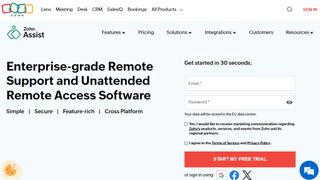
Reasons to buy
Reasons to avoid
Cloud-based Zoho Assist is one of our favorite remote access tools because it enables you to access almost any device. It provides specialized remote support and unattended access plans designed to streamline workflow processes.
Zoho Assist’s support plans include features such as remote printing and custom branding. They’re great for people such as support technicians and IT managers. More advanced features can also be accessed, with higher-end plans.
Zoho Assist is protected by some of the best security integrations we’ve seen, which means it’s a great choice for those working with sensitive data.
This is a remote desktop software solution that continues to improve and get better with age. Zoho Assist might lack the real muscle that very large concerns will need, but there is plenty here that will appeal to mid-size businesses that require a simple to use but potent solution.
We also take note of the free trial, which is longer than some others at 15 days. There is also a choice of plans, and like the flexibility in payments from monthly, to annually with a discount to serve different financial situations.
Zoho continues to make improvements to its Zoho Assist software too, with better options now available for people who want to make file transfers using the iOS and Android mobile editions. The same goes for the way you can work closely with Slack too. And, this being Zoho, there is solid support and integration if you use other products in the portfolio, such as Zoho CRM.
Read our full Zoho Assist review.
Best remote desktop software for tools
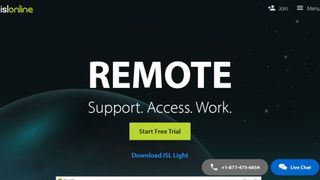
Reasons to buy
Reasons to avoid
ISL Online offers a number of powerful remote access tools, with multiple ways to support clients across a myriad of machines and platforms. On top of top-shelf security features and permissions tools for both techs and clients, it’s clear just how much ISL values user data across the board.
While some of the cloud-licensing fees can be a bit hefty (especially for smaller businesses), this is more than made up for by the massive bounty of tools, extensions, and add-ons that come with an ISL subscription. We like the choice of four tiers of plans, including up to Enterprise for larger organizations, and also the 15-day free trial on the lower plans.
For those new to the suite, there’s also an excellent built-in support team to help both you and your clients successfully integrate with ISL Online.
Read our full ISL Online review.
Best remote desktop software for mobile devices
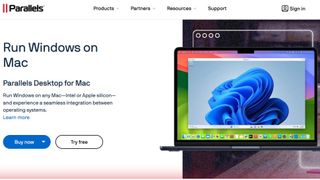
Reasons to buy
Reasons to avoid
Parallels Access is designed for remote computer access from mobile devices. It does support computer–computer connections, but the majority of its features are mobile-centered. Reasonable prices make it one of the more affordable options on this list.
One of our favorite things about Parallels Access is its tidy user interface. Rather than simply showing your desktop screen on a mobile device, like most of its competitors do, it presents an optimized, mobile-friendly version. Overall, this program is a great choice for those who want to remotely access their computer, particularly from a mobile device.
If you’re a regular user of mobile and tablet devices, such as an iPad, the options offered by Parallels Access make it a must-have. The very straightforward way it both functions and delivers access means the software can be operated by anyone and from anywhere. There’s even the option of working remotely using the same gestures called upon for other functions when using an iPad.
Admittedly, there are some limitations regarding the number of machines you can connect to, specifically 5 on either Personal plan, although business users can opt to add extra capacity as needed. However, going down this route then makes the costs go up. If you’re a business owner who needs to allow remote access for multiple staff members, then other options might represent a better value. For individual users though, Parallel Access certainly shines.
Read our full Parallels Access review.
Best remote desktop software for occasional users
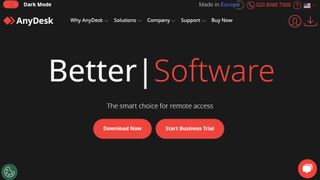
Reasons to buy
Reasons to avoid
AnyDesk software works by offering access to Windows and Mac computers, as well as iOS and Android mobile devices. There’s a built-in file manager for easy transfer of content between host ad remote machines, although there is no provision for the drag-and-drop processing of files.
Organizational duties are covered by an address book system to track all computers that are being accessed remotely. There are also plenty of tools for easy collaboration, with a text chat box, for example, that can assist with remote support duties. There’s a virtual whiteboard and the ability to invite other users onto your network, which is quite neat for support scenarios.
We’re big fans of AnyDesk and it really comes into its own for anyone wanting remote desktop access on an occasional basis, and that doesn't need all of the bells and whistles. However, there are some shortcomings if you’re running a larger business with the need for the sort of power tools found in something like TeamViewer. Nevertheless, AnyDesk is an easy-to-use package, and the pricing is okay too; it’s even better if you only need the free edition.
Read our full AnyDesk review.
Best remote desktop software for Windows users
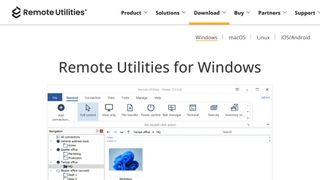
Reasons to buy
Reasons to avoid
If you’re looking for an affordable remote access program without the costly ongoing fees, Remote Utilities for Windows could be for you. It comes with a range of impressive features, including file transfer, video calls, and session recording. A free technician license allows you to access up to 10 remote computers. An enterprise-level site-wide license supports unlimited users.
Remote Utilities for Windows is an extremely affordable remote desktop connection manager for Windows computers. Licenses are a one-time cost rather than a subscription, which can ultimately save a significant amount of money for businesses small and large. We also note the offer of the 30-day fully functional trial, which is enough time to determine if it meets your needs.
The software has a number of small but highly useful features that can help IT teams manage helpdesk services. While it would be much better if this platform had support for Mac and Linux computers, that shouldn’t be a dealbreaker if your company primarily runs on Windows devices.
Read our full Remote Utilities for Windows review.
Best remote desktop software for unattended access
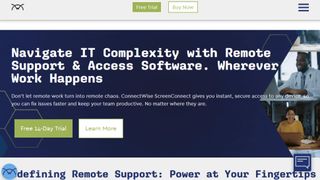
Reasons to buy
Reasons to avoid
ConnectWise ScreenConnect, formerly known as ConnectWise Control, provides highly specialized remote access solutions targeted at specific users. Its three Support plans come with some remote access features, and include powerful tools to help IT staff and support technicians solve problems remotely. The Access plan allows for 25 devices and is aimed at those who want to connect with numerous remote devices.
Overall, ConnectWise ScreenConnect is a solid remote computer access program with a few flaws. Its pricing structure is clear, but with the cheapest plan starting at $30 per month when paid annually ($38 monthly), it’s certainly not the most economical option around. Keep in mind those prices include 25 unattended access agents.
Fortunately, though, ConnectWise ScreenConnect provides a range of additional features for remote access, support, and team meetings. However, the web user interface is quite cluttered and considerable lag can be a problem at times. Ultimately, ConnectWise ScreenConnect’s decent customer support and great security features mean that it gets the thumbs up from us, but be aware of its flaws.
Read our full Connectwise Control review.
Best free remote desktop software
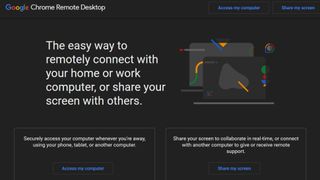
Reasons to buy
Reasons to avoid
Chrome Remote Desktop is a free remote access program that’s available on Windows, Mac, Linux, iOS, and Android devices. It's extremely limited when compared to some of the paid options on this list, but it’s the best free software we’ve come across and is a great option for personal use.
Since Chrome Remote Desktop is available as a browser extension, it can be used on any device that supports the Chrome browser. It is a little limited on mobile devices, but it’s easy to set up and is certainly worth considering.
Overall, Chrome Remote Desktop offers excellent performance and accessibility, and it works well for accessing a remote desktop on Mac, Windows, and Linux. While the mobile app doesn’t provide quite the same functionality, it’s still a decent way to access a desktop remotely. The Remote Support tool perfectly adapts Chrome Remote Desktop for support contexts.
On the other hand, the lack of features such as drag-and-drop file transfers, remote printing, and live chat between devices makes the application substantially less efficient in some use cases. Furthermore, you won’t be able to access live support if you run into any issues. Overall, Chrome Remote Desktop is a simple and straightforward option, but it’s missing several features that are critical in a variety of business contexts.
Read our full Chrome Remote Desktop review.
Best remote desktop software for reliability

Reasons to buy
Reasons to avoid
GoToMyPC makes it really easy to access a remote desktop from another device. You can download the app on your desktop (Windows and macOS) or mobile device (Android and iOS). Once installed, you can initiate a remote PC connection and access your files and applications as if you were sitting in front of the remote PC.
This platform has a reputation for being reliable. Once you've connected, you're free to use the remote computer as you like, either for work or leisure. We observed reports from customers of it getting slow when on a weak internet connection, but that’s normal with remote access software.
GoToMyPC makes it easy to transfer files between the device being remotely accessed and the one you're using to remotely access it. This feature is important for enterprise users who'll need to access files constantly for their work functions. There’s also Multi-Monitor support, meaning you can remotely access different devices simultaneously. However, doing this can slow down your speed, so ensure to do it only on devices with fast processors.
Users can access Real-Time Diagnostics if they're having issues with the platform. This is a dashboard that gives full visibility about device connectivity and performance to help users pinpoint the source of problems that may arise when remotely accessing any device. You can use it to diagnose the problem as well as get suggestions to fix it. In case you can’t find the solution there, the platform’s technical support team is available to contact 24/7.
Other notable features include usage reports to keep track of your sessions, remote printing, and the ability to invite a person to temporarily connect to your PC. The major drawback of GoToMyPC is that its pricing is much higher than most competitors.
Read our full GoToMyPC review.
Best remote desktop software for security
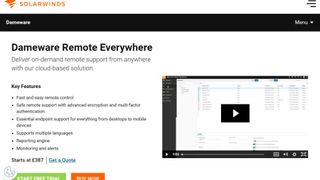
Reasons to buy
Reasons to avoid
Dameware Remote Everywhere is one of the most sophisticated remote desktop access tools you can get your hands on. It has a reputation for providing very fast connections to remote devices to use them as if they were in front of you. It uses advanced encryption protocols to keep user data safe and secure from malicious actors. It also supports two-factor authentication and multi-level permissions to prevent intruders from breaking into a corporate network and accessing their computers.
This platform has multi-monitor support, meaning you can work with different monitors simultaneously and switch between them with a single click. But, we observed customer complaints about the multi-monitor feature being unreliable and needing improvement.
You can take screenshots and record each active session of accessing a remote desktop. You can also save the recorded sessions in cloud storage to retrieve them later. There's support for live chat and video calls in case administrators need to connect with their users, and all chat messages are automatically saved in session logs.
The Alert and Monitoring system of this platform makes it easy for enterprises to stay on top of their remotely connected computers and ensure they’re always working as needed. You can set up custom alerts with unique specifications, for example, if the Memory load hits a certain number. You can also generate reports about specific activities on the platform to help you know if there’s an issue.
A unique feature of Dameware Remote Everywhere is that you can remotely wake computers that have been put to sleep or shut down. The requirement for this feature to work is that the computer you’re using for remote access and the one you want to wake must be connected to the same network.
Dameware Remote Everywhere is one of the best remote access tools but comes at a high price. It starts at $589 per license, with a discount on the unit price the more licenses you buy. Each license includes one year of annual maintenance, and you'll have to pay after that if you need maintenance and technical support.
Read our full Dameware Remote Everywhere review.
Best remote desktop software for simplicity
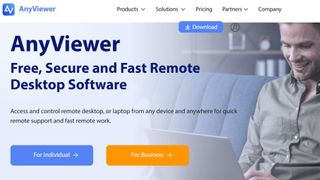
15. AnyViewer
Reasons to buy
Reasons to avoid
AnyViewer is a free and secure remote control software developed by AOMEI Technology. It allows users to access their data, applications, and files from any place and any device. It’s also quite secure, using end-to-end encryption via a strong 256-bit Elliptic Curve Cryptography (ECC) algorithm. The high level of encryption also makes it a good choice for accessing confidential data while on the go.
As mentioned, AnyViever is free initially, but there are also paid plans if you want to get more out of the software. You have a choice between Professional and Enterprise options, with the former being priced at $3.58 a month and is more suited for personal users. You’ll get unlimited channels and simultaneous sessions, 24/7/365 Support, access in privacy mode, high resolution, a higher number of login and managed devices compared to the free version, and more.
The Enterprise plan is priced at $16.58 a month and comes as a solid upgrade to the Professional plan: higher speeds, more licensed users (30), more managed devices (300), and more login devices (100). Furthermore, Enterprise users get priority in support, and a couple of business-oriented features such as mass deployment (MSI).
Windows users can transfer files to one or multiple remote PCs at speeds up to 10MB/s.
Apart from Windows, there’s support for both Android and iOS, making it a great choice for mobile users. The software has a simple interface which makes it easy to get around.
Honorable mentions
There are a huge number of remote desktop solutions on the market, with each one promising to facilitate secure, seamless access to resources from afar. In addition to the software that we've highlighted above, we've taken a look at countless other solutions competing for the title of the best remote desktop software available.
Although we think that the solutions above represent the best of the best, there are others that you might want to consider. Here are a couple of our honorable mentions:
- RealVNC Connect: While it may not be as slick as some of the other remote desktop software we tested - we did notice an annoyingly slow framerate - RealVNC Connect still has a lot going for it. It's secure and lightweight, with pricing that is sure to appeal to smaller businesses.
- Action1: If you only need remote access to facilitate tighter security, then perhaps Action1 is for you. It enables corporate IT teams to manage the security needs of in-office and remote workers from a unified dashboard - especially important now that hybrid work is increasingly common.
Make your home workers secure and productive with a remote access VPN.
Best remote desktop software FAQs
What are Remote Desktop Services (RDS)?
According to Vinod Jeyachandra, CTO of Anunta Tech, in Microsoft Windows, Remote Desktop Services is a platform that lets users share desktop environments between one Windows computer and another over the Internet. By setting up RDS on a Windows server, then using a Remote Desktop Protocol (RDP) application like Microsoft Remote Desktop, you can log in from another computer to a Windows environment that is hosted via RDS.
Once you log into the RDS-hosted PC environment, you can usually access all of the same local resources - including storage, applications, the Windows desktop interface and so on - that you would be able to use if the RDS environment were an actual PC that was sitting in front of you. RDS can also be configured to make only certain applications available to remote users, if admins choose to set it up that way.
Typically, the machine that hosts RDS runs in the same physical location - such as the same office building - as the computers from which users access the remote desktop environments. It is also possible, however, to install RDS on a server running in the cloud and share desktops from the cloud.
He noted, for the record, RDS in this context should not be confused with Amazon RDS, a cloud-based database service that does not have anything to do with Windows RDS.
Which remote desktop software is best for you?
When deciding which remote desktop software to use, first consider what your actual needs are, as the range of remote desktop platforms also offer a varied range of tools, features, and utilities. Budget software options can sometimes provide everything you may need, but high-end remote desktop software can really cater for every possibility, so do ensure you have a good idea of which features you think you may need to save on the pain of changing to a different software platform later on.
| Row 0 - Cell 0 | Paid or free | Compatibility | Trial period |
LogMeIn Pro | Paid | Windows, macOS, Android, iOS | None |
Splashtop | Paid | Windows, macOS, Android, iOS | 7 days |
TeamViewer | Paid | Windows, macOS, Android, iOS, Linux, ChromeOS | None |
Remote Desktop Manager | Free | Windows, macOS, Android, iOS, Linux | 30 days |
RemotePC | Paid | Windows, macOS, Android, iOS, Linux | 7 days |
Zoho Assist | Free | Windows, macOS, Android, iOS, Linux, ChromeOS | 14 days |
ISL Online | Paid | Windows, macOs, Linux, ChromeOS (viewing only) | 15 days |
Parallels Access | Paid | Windows, macOS, Android, iOS | 14 days |
AnyDesk | Free | Windows, macOS, Android, iOS, Linux, ChromeOS | 14 days |
Remote Utilities for Windows | Paid | Windows | 30 days |
ConnectWise ScreenConnect, | Paid | Windows, macOs, Linux, ChromeOS (viewing only) | 14 days |
Chrome Remote Desktop | Free forever | ChromeOS | N/A |
GoToMyPC | Paid | Windows, macOS, Android, iOS | 7 days |
Dameware Remote Everywhere | Paid | Windows, macOS, Android, iOS, Linux | 14 days |
AnyViewer | Free | Windows, Android, iOS | N/A |
How we tested the best remote desktop software
Remote desktop software has developed rapidly since the pandemic began, making it easier for remote workers and hybrid teams to connect safely and securely with business networks. For this independent review, we’ve analyzed some of the best-known remote desktop software solutions on the market, evaluating them for their usability, features, and integration with other software. How they stand up to the new rigors enforced by the COVID-19 pandemic has also been considered. In terms of what you should look for in a remote desktop tool, scalability, reliability and security are also important. These are factors that we carefully assessed before choosing our best remote desktop software solutions.
Read how we test, rate, and review products on TechRadar.
Get in touch
- Want to find out about commercial or marketing opportunities? Click here
- Out of date info, errors, complaints or broken links? Give us a nudge
- Got a suggestion for a product or service provider? Message us directly
- You've reached the end of the page. Jump back up to the top ^
Are you a pro? Subscribe to our newsletter
Sign up to the TechRadar Pro newsletter to get all the top news, opinion, features and guidance your business needs to succeed!
Daniel is a freelance copywriter with over six years experience writing for publications such as TechRadar, Tom’s Guide, and Hosting Review. He specializes in B2B and B2C tech and finance, with a particular focus on VoIP, website building, web hosting, and other related fields.
